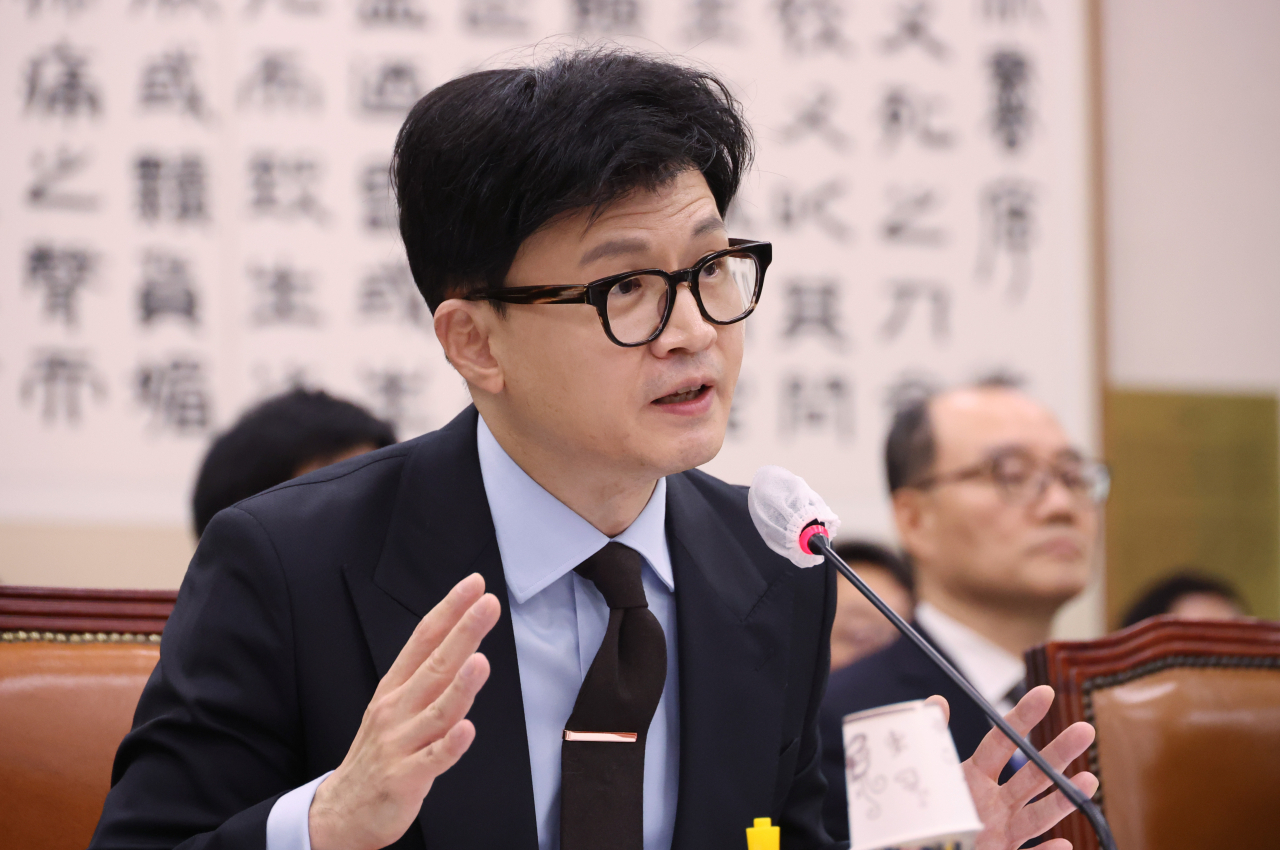 |
Justice Minister Han Dong-hoon speaks at the National Assembly on Tuesday. (Yonhap) |
There is currently one man in South Korea who many in the conservative bloc believe is popular enough to win voters' hearts, despite his lack of political experience.
The man of the hour is Justice Minister Han Dong-hoon -- President Yoon Suk Yeol’s right-hand man and a strong candidate to lead the ruling People Power Party at its helm into next year’s April general election.
A survey conducted by local polling agency Gallup Korea earlier this month showed Han as Korea’s No. 2 “favorite future political leader” with 16 percent support. The survey, which involved 1,000 Koreans aged 18 and older, placed the incumbent main opposition Democratic Party of Korea leader Lee Jae-myung at No. 1 with 19 percent.
Han surprised observers with the poll, as he outranked conservative political bigwigs such as incumbent Seoul Mayor Oh Se-hoon and current Daegu mayor and five-term lawmaker Hong Joon-pyo by wide margins.
After Yoon took office last year, Han has since beaten down attacks from opposition parties with a logical sensibility honed from his background in law. Many of his arguments, emphasized through his calm demeanor, were broadcast on live news, seemingly impressing both viewers and voters.
With several conservative lawmakers voicing the need for Han to join the political sphere in the “era of reform,” all eyes are on whether he will take on the role of the ruling party’s interim leader ahead of the election.
The perfect timing
The People Power Party has been struggling with a leadership void since Rep. Kim Gi-hyeon announced his resignation after serving nine months as chairman last week. Kim stepped down on hopes that his move would win back voter trust and fuel an intraparty reform.
The move came some 40 days after the now-disbanded ruling party reform committee suggested Yoon’s close aides and party heavyweights either refrain from entering next year’s election or from vying for parliamentary seats in the conservative party's strongholds.
In dire need of a fresh candidate who could fill the vacancy, both mainstream party members and supporters have begun mentioning Han as a potential leader.
Some 200 ruling party lawmakers gathered at the National Assembly on Monday to discuss whether to name Han as their interim leader or the chairman of the election campaign committee.
The lawmakers also point out that Han's popularity among young Koreans, especially women in their 20s and 30s, will work in favor of the party's reform. The party has been at the center of criticism from young and female voters here for "weaponizing misogynistic and anti-feminist views" to win over a certain group of voters.
"Han is very popular among female voters in their 20s and 30s who are often skeptical of our party," People Power Party Rep. Yoo Sang-bum pointed out in a Tuesday radio interview.
Han's good reputation and his ability to deliver messages clearly and concisely has attributed to his popularity among voters of all ages, Yoo explained.
Amid growing calls for Han to step in, observers said Yoon and the current justice minister are seeking the right timing.
Kim Chong-in, a seasoned election campaign expert in Korean politics and former interim leader of the People Power Party, said in a Wednesday radio interview that it seems that Yoon has "made up his mind" to name Han as the party's interim leader.
"I think President Yoon has made up his mind on sending Han as the People Power Party's interim leader," Kim said.
"But I do think the timing might be too early for Han to enter politics," he added.
Han has been tight-lipped regarding the matter as of Wednesday, as the ruling party reportedly revealed plans to carry out discussions and collect internal opinions on selecting Han as its leader until this weekend. He has so far denied receiving any offers from the ruling party on taking the leadership role, but hinted that he would likely accept if the opportunity were to present itself.
On questions pointing out his lack of political experience, Han told reporters at the National Assembly on Tuesday, "Not all roads were meant to be roads at first. It is shaped into one when many people choose to walk through it together."
He added that often, "real crisis" comes not from a lack of experience, but when people try to be either too calculating or play it too safe.
Legal elite
Han joined the prosecution in 2001 and has been known as Yoon's right-hand man since then, working alongside the current president in investigations into high-profile cases.
He worked under Yoon on a corruption scandal probe in 2016 that led to the impeachment of former President Park Geun-hye. He has led investigations into a slew of key corruption cases against former ministers and business leaders as well.
Han earned his bachelor of law degree from the nation's top-ranked Seoul National University Law School, and passed the Korean bar exam in 1995. He has a master's degree in law from Columbia Law School in New York in 2005, and was admitted to the New York state bar shortly after.






![[Today’s K-pop] Blackpink’s Jennie, Lisa invited to Coachella as solo acts](http://res.heraldm.com/phpwas/restmb_idxmake.php?idx=644&simg=/content/image/2024/11/21/20241121050099_0.jpg)
